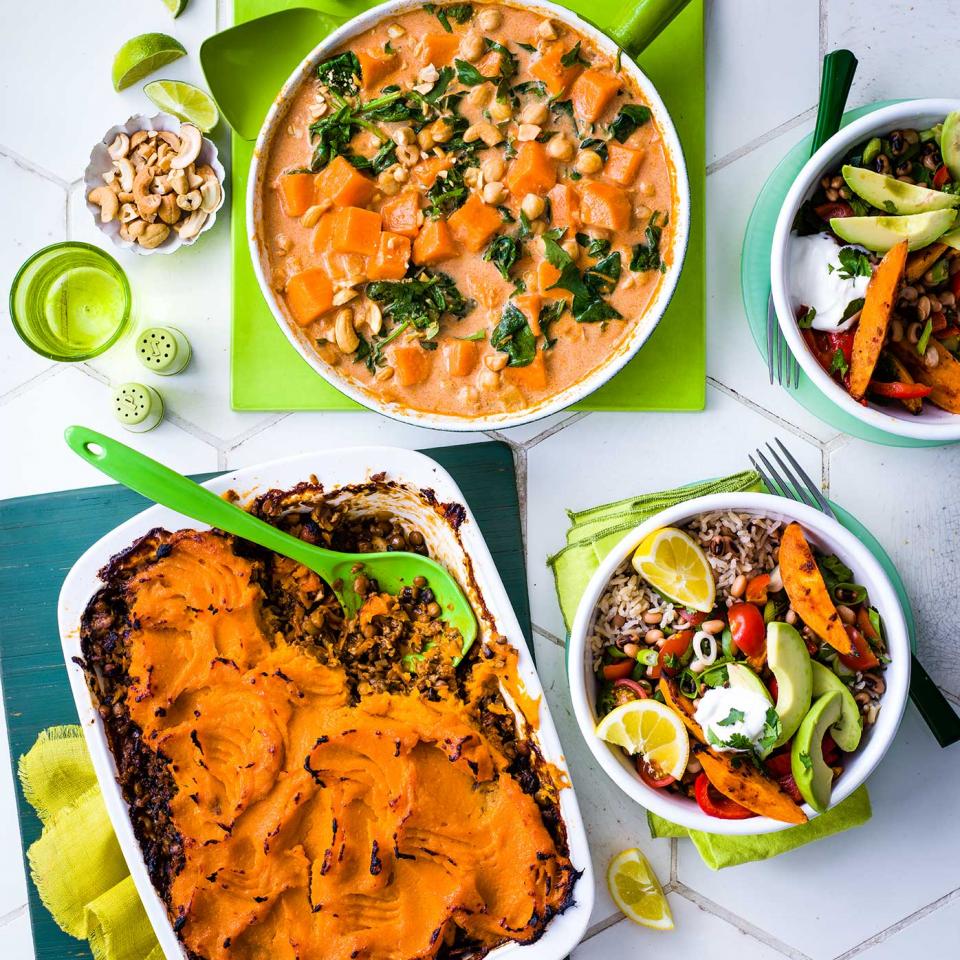Health
The health benefits of sweet potato
by Hannah Ebelthite

Cast your mind back a decade or two – you probably didn’t know what sweet potatoes were, let alone what to do with them. Today supermarkets are reporting record sales, with UK consumers eating 90 per cent more of them than five years ago. Their soaring popularity could be thanks to increased availability, affordability and versatility – but we’re also wising up to their health benefits. Here are eight nutrient-packed reasons to go sweet.
1. They count towards your five-a-day
‘Contrary to popular belief, sweet potatoes aren’t lower in calories or carbohydrates than white potatoes,’ says registered dietitian Helen Bond. ‘One medium sweet potato (weighing 238g raw) provides 217 calories and 48g carbohydrates, while the same-sized raw white potato comes in slightly lower at 201 calories and 43g carbohydrates.’ But sweet potatoes deliver an extra nutritional punch and, unlike regular potatoes they count towards your five-a-day fruit and vegetable target.
2. A source of fibre
‘You get 5.1g fibre in a medium sweet potato (versus 4.8g in a white one), so they’re a useful source that can help you achieve the recommended 30g a day,’ says Bond. Fibre helps to promote healthy digestion and keeps your system running, as well as reducing the risk of cardiovascular disease, diabetes and bowel cancer, but most adults only manage a daily average of 18g. ‘Leave the skin on for a fibre boost,’ suggests Clare Thornton-Wood, spokesperson for the British Dietetic Association.
3. Best for beta-carotene
Beta-carotene is an important nutrient our bodies convert to vitamin A – it’s vital for a healthy immune system and also beneficial for skin and eyes. It’s found in the pigment that gives orange vegetables their vibrant colour. ‘Sweet potatoes are one of the best sources,’ says Bond. ‘In fact, a medium-sized one will provide nearly double your vitamin A needs for the day.’ Just be careful not to overdo it. ‘Eating too many beta-carotene- rich vegetables (such as carrots or butternut squash) can result in carotinaemia, where your skin takes on an orange tinge,’ says Thornton-Wood. Yikes!

4. One sweet potato = 50% of your daily vitamin C needs
When it comes to good sources of cold-busting, immunity-boosting vitamin C, we think of citrus fruits and berries. But it turns out that sweet potatoes are also an excellent choice. ‘A medium orange provides 83mg vitamin C, while a sweet potato gives you 55mg, which is pretty high,’ says Bond. ‘Vitamin C is an antioxidant, helping to protect the body’s cells from damage. It also helps your body make collagen, needed for healthy skin, teeth and gums.’
5. But that's not all
If you’re after an all-round nutritional powerhouse, look no further. ‘Other significant nutrients in sweet potatoes include potassium, for healthy blood pressure, and some B vitamins, to support your nervous system, psychological wellbeing and energy release,’ Bond explains. ‘Plus there’s a good dose of the trace mineral manganese (48% of your daily requirement), for healthy bones and releasing energy from food.’
6. They’re sweeter than white potatoes – but have a lower GI
Carbohydrate-containing foods are rated on the glycaemic index (GI) from 0 to 100, according to how quickly they affect your blood-sugar level. Foods with a lower GI take longer to digest and release their energy, so the idea is they keep you fuller for longer and you eat less overall. Raw sweet potatoes have a GI of 61, compared with white potatoes at 82. ‘It’s worth noting that GI changes according to what you eat alongside the vegetable and how you prepare it,’ adds Thornton-Wood. ‘The longer you cook it, the higher the GI – boiling, steaming or microwaving maintains the lowest GI.’
7. Baking boosts their benefits
‘Cooking breaks down the sweet potato’s fibrous walls, making some nutrients more readily available,’ says Bond. ‘Bake or roast with a drizzle of olive oil and you’ll increase the beta-carotene you get from them. But if you boil them, you’ll lose some of the water-soluble nutrients, such as B vitamins and vitamin C.’ Beta-carotene is not destroyed by cooking, losses occur when it’s exposed to light and air, so it’s best to not store sweet potatoes for too long.
8. Add fat for extra benefits
Pairing sweet potato with the right foods can supercharge it. ‘If you add some fat or eat a sweet potato alongside protein, you’ll reduce the GI further because it will take longer to digest,’ says Bond. So drizzle oil onto your wedges and roast them, add butter or oil to mashed sweet potatoes, or eat with fish or chicken. And as a nutritional bonus, adding fat to your dish will also boost your uptake of vitamin A, as it’s fat-soluble.
Don't miss our favourite sweet potato recipes:












